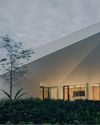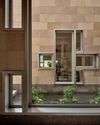
Cities have a love-hate relationship with international sporting events. On the plus side are the prestige the spectacle brings and the tourism dollars that its iconic stadiums draw. On the minus side is the infrastructure investment necessary for an extremely brief experience. Many municipal governments simply do not want to be saddled with white architectural elephants; they are not worth the newsfeed headliners.
Nevertheless, Chinese cities feel that world class sporting events can only be good: for its development, people and international cache. Over the past few decades, both the Olympics and Asian Games have been hosted by Chinese cities. Naturally, when Hangzhou welcomed international athletes in the fall of 2023, it needed its own version of the Birds' Nest. To that end, New York-based Archi-Tectonics won a 2018 competition to design the landmark stadium for the 2023 Asian Games.
green sponge
Ready to kick off the Games in September, the 35,000 sqm building is sited at the south end of a 47-hectare newly created eco park in the Gongshu district of Hangzhou. The capital of Zhejiang province has long been regarded as one of China's most beautiful cities, with an abundance of classic Chinese structures set against picturesque lakes.
Contemporary Hangzhou is known for its economic and e-commerce prowess, with many company headquarters including Alibaba interspersed within a population of 13 million. To accommodate its rapid development, much of the wetlands of the city’s outskirts have been replaced by skyscrapers. “The government took the opportunity of the Asian Games to create a new eco park as a green lung and exemplary implementation of the ‘sponge city’ concept (to retain, collect and filter rainwater for re-use in the stadium) for this fast developing neighbourhood,” explains Winka Dubbeldam, founding partner of Archi-Tectonics.
This story is from the Issue 131 edition of d+a.
Start your 7-day Magzter GOLD free trial to access thousands of curated premium stories, and 9,000+ magazines and newspapers.
Already a subscriber ? Sign In
This story is from the Issue 131 edition of d+a.
Start your 7-day Magzter GOLD free trial to access thousands of curated premium stories, and 9,000+ magazines and newspapers.
Already a subscriber? Sign In

Tailored For The Curious Explorer
The new Alma House at the New Bahru enclave reflects the collaborative spirit of a school environment.

Eco And Egalitarian
Can a building represent a culture? Berrel Kräutler Architekten's sensitive renovation of the Embassy of Switzerland in Singapore stimulates discourse.

Building A Green Home
This semi-detached house by Zivy Architects explores passive tropical design, the delight in architecture and the issues of multi-generational living.

The Natural Balance
Inspired by the serene beauty of dewdrops, the Antao Collection by Villeroy & Boch transforms bathrooms into wellness sanctuaries, combining sustainability with timeless elegance.

Inspiring Creativity And Exploration
The new Hafary House at Lavender reflects the brand’s vibrancy and innovation, as well as provide an inspiring and engaging space for customers.

Home Is Where The Heart Is
A vacation house is reimagined for a multi-generational family to gather for holidays in the bucolic setting of Yongjia in Zhejiang, China.

balancing act: nature and humanity
In this inspiration-led series, we asked Jay Liu and Alex Liu, co-founders of Right Angle Studio, to dream up a unique interior concept using mainly items from Space Furniture.

rethinking, remaking, reframing
Aoki Akio, the founder of DESIGNART TOKYO discusses the importance and legacy of Tokyo's eminent art and design event, particularly for young creatives.

rebuilding communities
Shift2024, the much-anticipated conference returns with a stellar line-up of prolific architects making their mark in Asian urban design.

unparalleled italian craftsmanship
Filippo Arnaboldi, Chief Executive Officer of Frette, tells us how this luxury lifestyle Italian brand is moving forward with times yet not forgetting about its existing legacy.